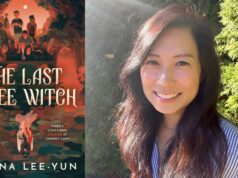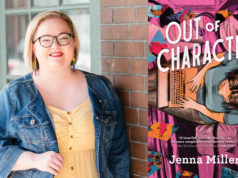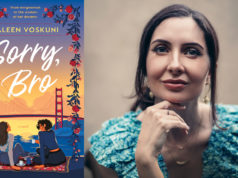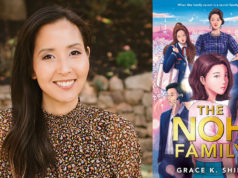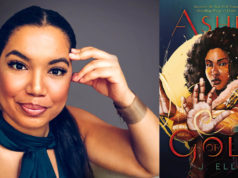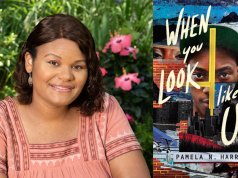
(Editor’s note: NonDoc’s Author Umbrella interviews up-and-coming writers, particularly authors of color, authors of disability and LGBTQ authors. The interviews have been transcribed and lightly edited for length and clarity.)
For this week’s Author Umbrella series, I interviewed Nina Moreno, author of Don’t Date Rosa Santos. Her debut novel, published by Disney-Hyperion, hit shelves on May 14, 2019.
Rosa Santos is cursed by the sea — at least, that’s what they say. Dating her is bad news, especially if you’re a boy with a boat.
But Rosa feels more caught than cursed.
Caught between cultures and choices. Between her abuela, a beloved healer and pillar of their community, and her mother, an artist who crashes in and out of her life like a hurricane. Between Port Coral, the quirky South Florida town they call home, and Cuba, the island her abuela refuses to talk about.
As her college decision looms, Rosa collides – literally – with Alex Aquino, the mysterious boy with tattoos of the ocean whose family owns the marina. With her heart, her family, and her future on the line, can Rosa break a curse and find her place beyond the horizon?
1) In a way the ocean seems like a character in this story because of the role it has in affecting so many aspects in Rosa’s life. As a Floridian, what relationship do you have with the ocean and how did that influence your writing?
some of my hurricane prep pic.twitter.com/mvepDK8jgw
— Nina Moreno (@Nina_Writes) September 2, 2019
My connection to the ocean feels so much older than me. It’s this endless thing that reminds me how much bigger the world is than me, but it’s also the tiny stretch of miles between where I was born and where my dad could never return.
Maybe it’s the islanders I come from, but the sea feels like a sacred, constant pulse that has shaped me in so many ways. I’ve stood in front of it, just as my ancestors before me. Homes are lost, people are exiled, but the sea remains. I’m always in conversation with that.
2) Rosa is at a busy interval in her life – juggling school, family, friends – when she runs smack dab into Alex. Can you tell us more about him?
Alex is tall, anxious, and tattooed with the sea. He struggled academically through high school, but after dropping out during his first year of college, he returns home to Port Coral and all the expectations he failed to meet.
Life is tough on land, but on his boat, he’s confident and the world finally makes sense. Like he tells Rosa, he might’ve failed physics, but he’s one heck of a sailor.
And yes, he bakes the most incredible desserts. Alex finds it soothing. Like knot work and tinkering on his boat.
3) When I read Don’t Date Rosa Santos, I spent about 80 percent of the time hungry for pastelitos. What baked goods would you recommend readers have on hand while reading, and where can we get the very best pastelitos in Florida?
Rosa and I love our pastelitos, but thanks to Alex, there are a lot of desserts in the book. Hummingbird cake, cookies, lemon ice cream, and even dulce de leche bars.
I say have whatever sweet makes you feel happy and cozy on standby for when Rosa finds herself in Alex’s kitchen.
And as far as the very best pastelitos? It almost feels dangerous to answer, but I’d have to say Vicky Bakery in Miami.
4) Rosa’s mother and abuela seem like major figures in her life. How would you describe the relationship between these three very different women?
It’s a loyal, deep, but complicated love between them. But that’s family.
And that’s also sometimes culture and faith. We love our homes, even when we can’t return to them.
We are our culture, even when it changes and adapts. In a lot of ways, the three of them represent the past, present, and future of a single journey.
5) I adore the gossiping viejitos who know everyone’s business. What was it like writing their characters?
It’s funny because they’re always one of the first characters readers ask me about. “I loved Rosa and Alex, but the viejitos!”
I loved getting to write them and how important they became to Port Coral.
Here is this story where the three central Latinas don’t know how to talk to each other, but the old men throwing dominos outside the bodega are talking about everything and everyone.
6) Don’t Date Rosa Santos deftly addresses generational trauma. As a Cuban-American, how do you think your own experiences informed your writing?
It made me constantly aware of the weight of telling this story and how desperate I was to get it as right as I could.
I spent a long time wondering if I could tell a Cuban-American story, despite it being mine.
7) What aspects about Don’t Date Rosa Santos do you think would appeal to Oklahoma City readers?
When readers pick up this book, and dust away all the sugar and sand, I hope they find a contemporary story with a hint of magic, but plenty of romance, family, and love for home.
And I hope for 300 pages, it transports them to a sleepy, seaside hometown they’re invited to collect as one of their own.










